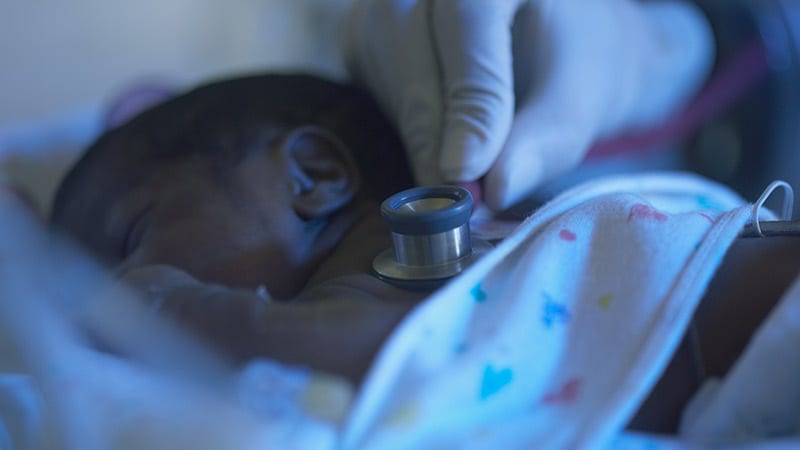
PARIS — Will the traditional newborn screening program developed 60 years ago by Dr Robert Guthrie soon be superseded by genome screening at birth? Routine sampling and analysis of newborn DNA would allow us to screen for many hundreds of childhood genetic diseases. This is the claim made by David Geneviève, MD, PhD, chair of the French Association of Clinical Geneticists and lecturer at the University of Montpellier, France, at the 9th annual conference of the French Society of Predictive and Personalized Medicine (SFMPP).
To date, newborn screening has consisted of taking a drop of blood from a newborn’s heel. In the future, DNA samples could be taken from babies for whole genome sequencing to look for diseases that are likely to crop up later in life.
The Challenge
“In France, nearly all of the 720,000 babies born each year undergo newborn screening (only 300 refuse),” said Geneviève. For 60 years, newborn screening has tested for phenylketonuria, congenital hypothyroidism, congenital adrenal hyperplasia, sickle cell disease, cystic fibrosis and medium-chain acyl-coenzyme A dehydrogenase (MCAD) deficiency.
On January 1, 2023, France’s national newborn screening program added seven new diseases, bringing the number of rare diseases screened for to 13. The new diseases are homocystinuria, maple syrup urine disease, tyrosinemia type 1, isovaleric acidemia, glutaric aciduria type I, long-chain 3-hydroxyacyl-coenzyme A dehydrogenase deficiency, and carnitine deficiency.
“There aren’t just 13 childhood diseases,” continued Geneviève. “There are several hundred rare diseases, and genome sequencing tools allow us to broaden our screening capabilities. It’s inevitable that the ability to sequence your child’s genome at birth will become a possibility. It’s highly likely that within 10 to 15 years, all newborns will have their genome determined at birth for screening purposes.”
Current International Trials
Genome sequencing has already been studied for several years in multiple countries. New York’s Guardian study requires all newborns taking part to undergo genome sequencing. “Our English-speaking colleagues use the genome to screen for childhood diseases that would benefit from treatment (235 can be treated) but also as a preventive measure and a way of providing early therapeutic education,” said Geneviève.
In 2016, American researchers launched the BabySeq Project, which was conducted at several sites (Boston, New York, Birmingham, Detroit, and Philadelphia). One of its aims is to assess the medical, psychological, and financial impact of screening via genome sequencing at birth, compared with conventional screening.
In North Carolina, 25,000 newborns took part in the Early Check study, a neonatal genetic screening project focusing on childhood spinal muscular atrophy, fragile X syndrome, and Duchenne muscular dystrophy.
In the United Kingdom, Genomics England seeks to assess the feasibility, benefits, and risks of whole genome sequencing as part of the Newborn Genomes Programme, an analysis of 100,000 newborn genomes. Projects are also underway in Belgium, Italy, and France (PeriGEN MED in Dijon).
Dijon’s Specialist Team
The conditions for considering neonatal screening of a disease are determined by the healthcare authorities in each country and vary greatly from one state to the next.
To date, in France, the only genetic screening authorized is for childhood spinal muscular atrophy via identification of an anomaly on SMN1. It has not yet been implemented, but a pilot study of its use is underway.
“If we are able to identify the 40 newborns affected by spinal muscular atrophy from birth, we can offer these patients gene therapy and stop them from dying at 1 or 2 years of age,” said Geneviève.
In the future, France should draw up a list of diseases for which genetic screening is useful, he added.
Although France’s initiative for genomic medicine, France Génomique 2025, does not envisage a neonatal genome sequencing screening program, a team in Dijon is studying several dozen genomes to determine the medical and financial benefits of such a program, explained Geneviève.
Ethical Issues
Of course, this technological achievement raises ethical issues. “What do we do with the genetic data obtained at birth that won’t become apparent until adulthood, if we find a BRCA1 or BRCA2 variant in a newborn’s genome?” asked Genevieve.
Will the information obtained be stored somewhere? “This is a real issue,” said Geneviève. “The English have a national system. In their newborn screening program, when an infant grows into adulthood, he or she can have access to the genetic data.”
There is also a big risk that women will be pressured to undergo genetic testing during pregnancy. “No genome-related antenatal tests are carried out unless there are concerning ultrasound findings and only to look for particularly severe incurable diseases,” said Geneviève.
Not Like Gattaca*
Financial obstacles should be quickly pushed aside. The cost of genome sequencing has decreased in the past few years. The first sequencing in 2003 cost close to $3 billion. Nowadays, it can be done for less than 1000 € (just over $1000).
Although neonatal genetic screening would enable us to limit the development of serious diseases, the decision to use such testing routinely must be made by society as a whole, Geneviève concluded.
“We often oppose preventive and personalized treatment strategies. Now the two have joined forces,” said Pascal Pujol, MD, PhD, chair of SFMPP.
For Pujol, broadening the application of genome sequencing is a no-brainer. “It won’t be like in Gattaca,” he reassures us. “It wouldn’t be done to determine a person’s character but [rather] to prevent those rare diseases that affect 4 to 5% of the population.”
* A reference to Andrew Niccol’s 1997 science fiction movie Gattaca. The film is set in a futuristic world in which parents can choose the genotype of their children to conceive test-tube babies with the fewest defects and the most advantages possible for society.
This article was translated from the Medscape French edition.
Source: Read Full Article